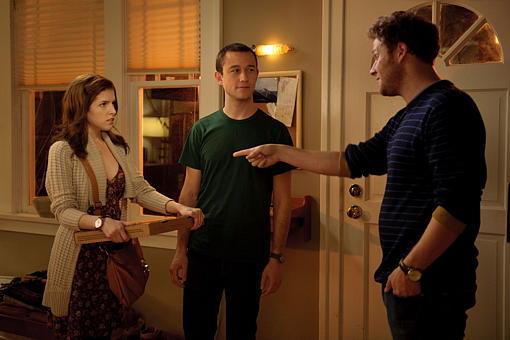By Jim Rohner · October 3, 2011

Adam (Joseph Gordon-Levitt) has cancer. A 27-year old health-conscious non-smoker and non-drinker, to say that Adam is surprised and thrown off balance by the news of his rare spinal cancer is an understatement. Adam, like all of us, had plans for his life, not the least of which involved completing his story on an inactive volcano in Hawaii for his Seattle public radio job and taking the next step with his painter girlfriend, Rachael (Bryce Dallas Howard). But cancer, as is the case with all tragedies, threatens to change things, perhaps permanently.
The diagnosis creates a ripple effect for those near and dear to Adam, who all mean well with their intentions despite inadvertently exacerbating an already uncertain situation: Rachael vows that she'll take care of Adam in his time of need, but she finds herself unprepared for the emotional tax demands; Adam's mom, Diane (Anjelica Huston), insists on moving in and smothering her son with the love only felt by the mother of an only child; his best friend, Kyle (Seth Rogen), tries to remain upbeat, maintaining that Adam's odds of survival – 50/50 – are reason to be optimistic and that cancer will generate sympathy points for random sexual encounters for the both of them. Try and guess how all that works out. It's not their fault; they're only reacting in ways that are natural extensions of their inherent eccentricities. No one prepares for cancer, after all, especially not a 27-year old.
In an attempt to cope, Adam begins visiting a therapist, Katherine (Anna Kendrick), whose youth – she's only 24, not yet a doctor but "working on" her doctorate – cannot hide her inexperience, but also allows her to emotionally connect (perhaps too much) with her new patient more so than an older doctor probably could.
The therapy extends outside of the office as Adam's weekly chemo sessions find him regularly interacting with two other cancer patients: Alan (Philip Baker Hall), suffering from late stage lymphoma, and Mitch (Matt Frewer), battling against prostate cancer. These much older men remind Adam that there is humor still to be found in life while simultaneously serving as reminders of the potential fate that no one is willing to consider.
There is nothing funny about cancer, but 50/50 gives us permission to laugh at it anyway. When dealing with such serious subject matter, there is an inherent danger when trying to inject it with comedy – make the film too serious and the comedy becomes a failed attempt to bring levity to the oppression; make the film too funny and the laughs dilute and disrespect the gravity of the situation. It's a delicate balance, but one that director Jonathan Levine handles fantastically because he, along with screenwriter Will Reiser on whose life the film is based, recognizes that in real life, tragedy does not need to imply the absence of comedy. There are plenty of laughs to be had while watching 50/50, but they never distract from the matter at hand. Instead, they serve as a reminder to both Adam as the protagonist and to us as viewers that no matter what, life can be and will be funny whether intentionally or unintentionally.
The tagline for the film reads, "it takes a pair to beat the odds" and the title itself implies that with two halves, there cannot be a whole – without the 50% chance of death, the 50% chance of survival would be meaningless. Similar to how it would be impossible to understand comedy without tragedy (and vice-versa), Levine and Reiser recognize that for despair to exist, there needs to be hope; for loss, there needs to be gain; for grief, joy; and for heartache, love.
The filmmakers don't just recognize the natural dichotomies of life, they appreciate them as well, foregoing cliched speeches and earth-shattering moments for the sake of simple, knee-jerk reactions that only love can produce. Though initially annoying, hindsight reveals that we can't blame Adam's mom for rushing off to make her son a cup of tea after she hears he has cancer, nor can we blame Kyle for wanting to get his best friend laid; these are the ways they have loved him in the past and these are the only ways they know how to continue loving him.
Anchored by the steady performance of Joseph Gordon-Levitt,50/50 never loses sight of what's at stake for Adam and the people around him. There is a bit of Hollywood involved in the telling of50/50, but the film never purports to be true as much as it comments on the truth. It's likely that the vast majority of people who see this film do not have cancer nor know someone who does, but the fact that they'll all feel the weight of Adam's tears as he's rolled into surgery speaks volumes to that truth and to the ability of the filmmakers to convey it.